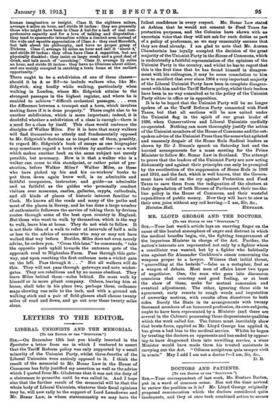MR. LLOYD GEORGE AND THE DOCTORS.
[To THE EDITOR OF THE "SPECTATOR.']
Sru,—Your last week's article lays an unerring finger on the cause of the heated atmosphere of anger and distrust in which the medical benefits begin, viz., the fighting temperament of the imperious Minister in charge of the Act. Further, the nation's interests are represented not only by a fighter where a conciliator was wanted, but by a fighter who habitually sins against Sir Alexander Cockburn's canon concerning the weapons proper to a lawyer. Witness that initial thrust, "quarrelling at the bedside "—false as a metaphor, foul as a weapon of debate. Most men of affairs know two types of negotiator. One, the man who goes into discussion conscious that courtesy and good feeling, or at least the show of these, make for mutual concession and eventual adjustment. The other, ignoring these aids to agreement, early resorts to rough words and imputation of unworthy motives, with results often disastrous to both sides. Surely the State in its arrangements with twenty thousand members of an honoured profession, its own subjects, ought to have been represented by a Minister (and there are several in the Cabinet) possessing those dispassionate qualities which the work called for. The future must inevitably show that brute force, applied as Mr. Lloyd George has applied it, has given a bad bias to the medical service. Whilst he began by treating the doctors as opponents and has ended by appearing to have dragooned them into unwilling service, a wiser Minister would have made them his trusted assistants in carrying out the Act. " Odimus accipitrem quia semper vivit in armis." May I add I am not a doctor P—I am, Sir, &c.,
D. B.






































 Previous page
Previous page